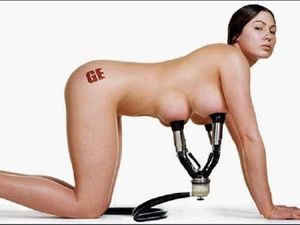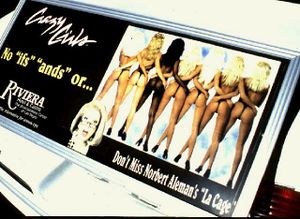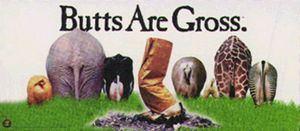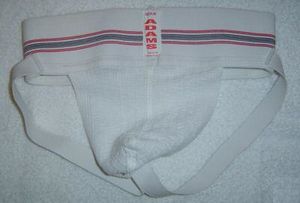Billboard Magazine
Billboard Magazine, a trade journal dedicated to the use of sex in billboard advertising, is famous for its full-color, airbrushed centerfold pictorial, "Billboard Babe of the Month."
History[edit | edit source]
According to the notoriously unreliable Wikipedia, the magazine began in 1894 as a trade paper for the bill posting industry before re-inventing itself as the paper of record for carnival freak shows, natural childbirth, operating theaters, and other live entertainment. In 1961, it focused on popular music, but it found its niche and true identity in 2006, as a chronicler of sex in advertising and a purveyor of softcore billboard porn.
Popular Features[edit | edit source]
Besides its "Billboard Babe" feature, another popular item is the magazine's "Hot 100," which showcases the "100 hottest billboards along American highways and byways." Among the billboards most frequently featured in the "Hot 100" are the signs in Las Vegas, Nevada.
The magazine also dedicates several pages of each issue to "Mobile Billboards," which showcase advertising signs on trucks and boats, which makes their unusually suggestive content "hard to monitor, hard to regulate, and hard to control." When advertisers do cross the line of decency, they receive stiff fines. Nevertheless, according to Billboard Magazine, despite "stiff competition," their profits continue to "rise" as their revenue "swells."
News Features[edit | edit source]
The magazine also devotes a few pages each month to industry news.
A recent issue ran a story about Ima Boob, a Missouri woman who is suing the Show Me State for exhibiting "lactose intolerance" toward a billboard that her company erected to advertise baby formula. The sign depicts a nude woman with bottle-shaped breasts above a caption that reads, "Titillation." Missouri authorities ordered the signs removed, saying that they constitute "a blight on the landscape." Just down the road, however, billboards advertise mountain oysters, or bulls' testicles. "Why is a mother's milk considered inappropriate, while a bull's balls are judged to be just dandy?" Boob demanded.
Another article chronicled the Philippines' attempt to outlaw any billboard as obscene that does not meet "the community's standards of decency," or, "taken as a whole," has "literary, artistic, or scientific value." Billboards that feature "naked women or any part thereof," automatically fail the test, according to a Quezon City official, because they constitute "indecent exposure." Men's bodies, on the other hand, are okay, as long as they don't show a bare chest, a bare back, or anything "below the belt."
Censorship was also the theme of a third story, "Butts Are Gross!" According to this piece, a billboard was condemned by Poets for Political Parity, a group of "literate lesbian feminists" who object to the "obvious pun" on cigarette butts and women's buttocks that the advertisement contains. Queer Crybabies, a gay activist group, also objects to the billboard, which they claim is "sooooo homophobic," adding, on behalf of gays everywhere, "our butts are not gross!"
Critics[edit | edit source]
Buttocks, transvestites, and lesbians are favorite subjects of these billboards, which have earned them the ire of feminists, who contend that such advertising "markets women's bodies and targets homosexual, rather than heterosexual, men and women, making Las Vegas a den of iniquity."
Right-wing political and religious groups agree with the feminist critics, calling these billboards "unfriendly to families."
Both groups criticize Billboard Magazine for promoting such advertising and call for it to return to its "wholesome past," when its pages were full of nothing more controversial than Jerry Lee Lewis' marriage to his underage cousin, Madonna's chaste kissing of Britney Spears' "sexy" derriere, and Janet Jackson's "wardrobe malfunction."
Defenders[edit | edit source]
However, Billboard Magazine also has its defenders, as do the billboards themselves. The Las Vegas City Council erected the controversial signs featured in many issues of the magazine to draw attention to "Sin City's lights and delights," says Mayor Oscar Goodman, adding, "We're a wide-open, adults-only, anything-goes, 24-hour town, and we want everyone, especially the mob, to know we're ready to do business." The casinos also like the billboards. "They're art," the spokesman for one casino asserted. "In fact, in Vegas, they're about the highest form of art a tourist is likely to see outside one of our strip shows." A noted defense attorney, Jacques Strap, and many others who profit from the signs' legal problems, applauds Billboard Magazine's "courage and integrity," in chronicling the nation's "art, entertainment, and business."



